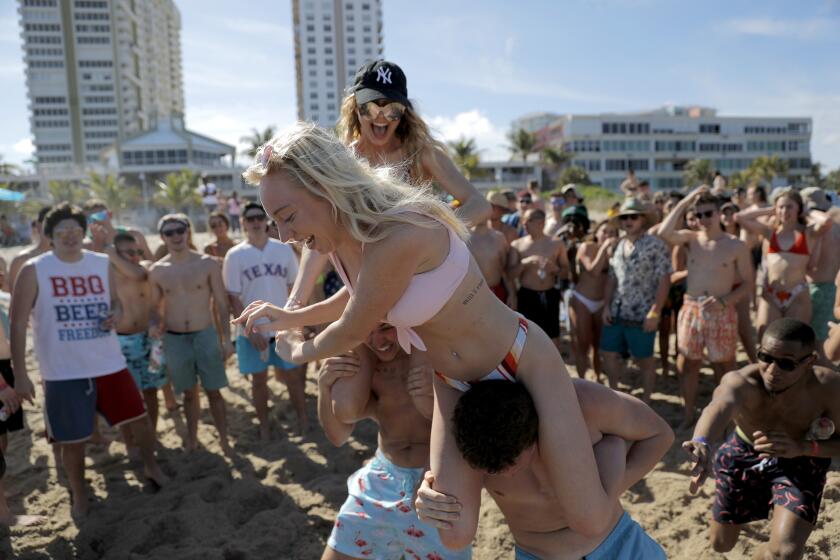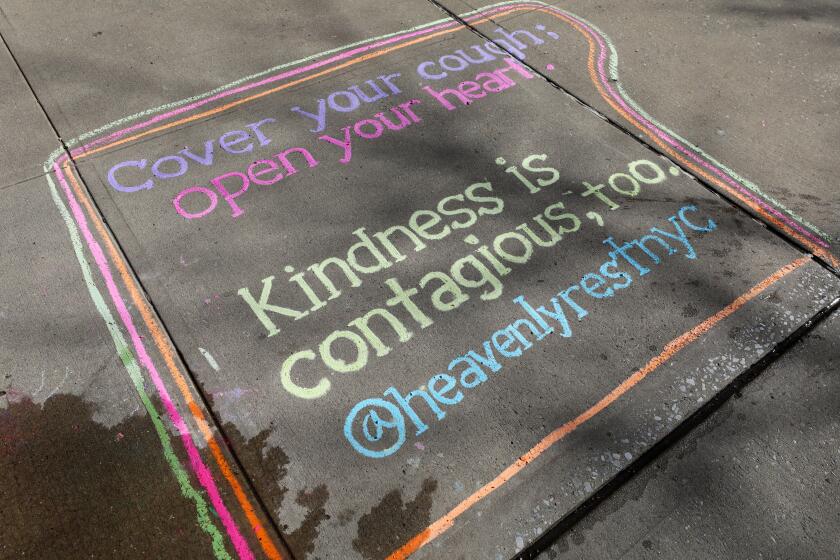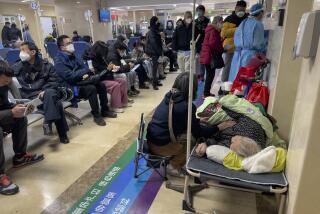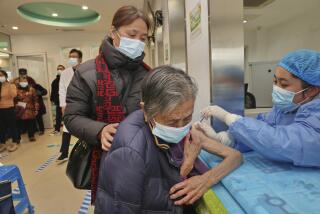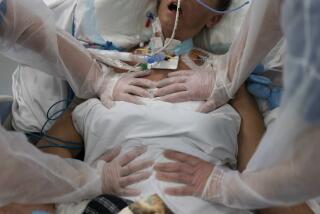Officials scramble to prepare hospitals as death tolls climb worldwide
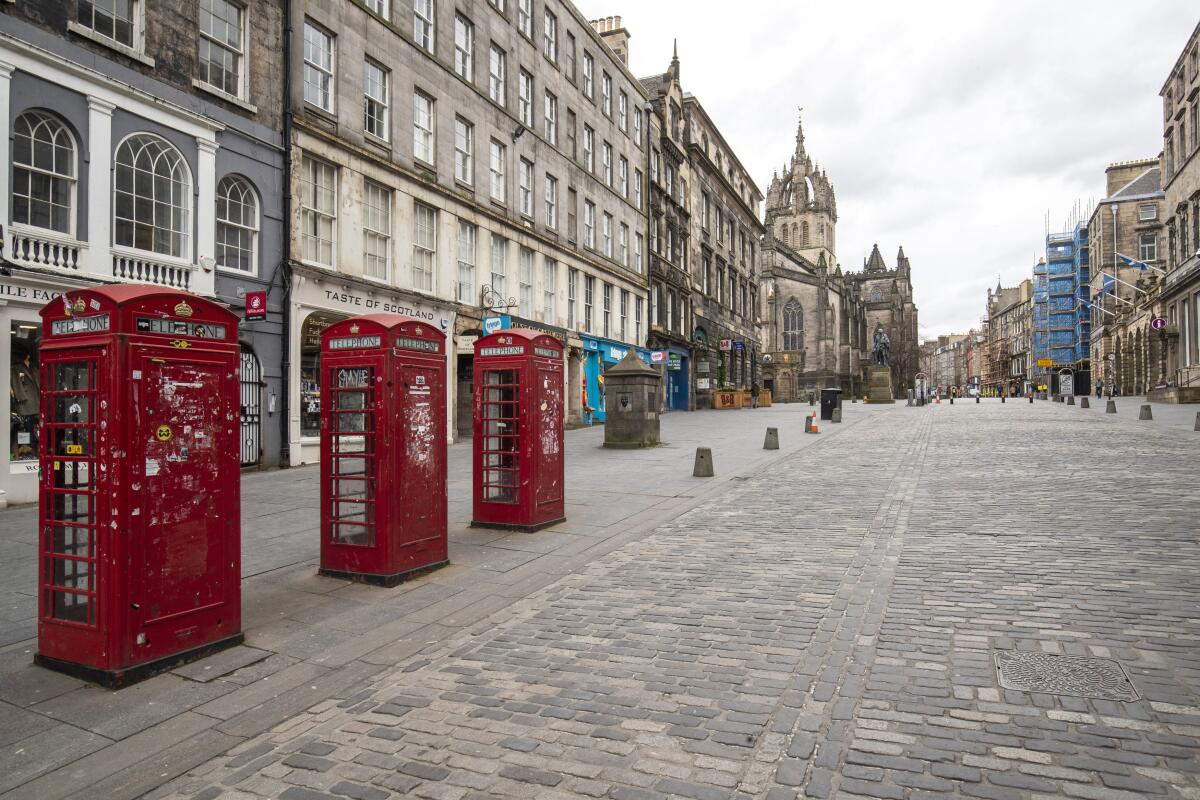
- Share via
SOAVE, Italy — Italy, Iran and the United States reported rising death tolls Sunday as the coronavirus pandemic marched across the globe, prompting a scramble in hard-hit regions to set up more hospital beds and replenish the dwindling medical supplies needed to keep health workers safe.
Italian Premier Giuseppe Conte went on live TV to announce that he was tightening the country’s lockdown and shutting down all production facilities except those providing essential goods and services.
“We are facing the most serious crisis that the country has experienced since World War II,” Conte told Italians during a broadcast at midnight.
As bodies piled up in Italian hospitals, morgues and churches, and as medical workers pleaded for more help, there was no sign that Italy was yet taming its arc of contagion. Italy now has 53,000 confirmed cases of COVID-19 and 4,825 deaths — more than all of China, where the virus first emerged late last year.
The U.S. government’s top infectious-diseases expert said he remained hopeful the U.S. was not on the same path as Italy in the coronavirus struggle.
Dr. Anthony Fauci, director of the National Institute of Allergy and Infectious Diseases, told CBS’ “Face the Nation” the stringent measures being put in place in the U.S., including travel restrictions, the closing of schools and many businesses and other social distancing, would go “a long way.”
From France to Florida to Australia, some defy the lockdown mandates and scientific advice to fight the coronavirus pandemic.
New York City’s mayor told people at the epicenter of the U.S. pandemic that it was only going to get worse.
Mayor Bill de Blasio said Sunday on NBC’s “Meet the Press” that his city was in desperate need of ventilators and other medical supplies and staff, and lambasted the White House as non-responsive. He said he had asked “repeatedly” for the U.S. military to mobilize and had heard nothing back.
U.S. Treasury Secretary Steven Mnuchin said he expected Congress and the White House to reach full agreement later Sunday on an economic stimulus package that could approach $2 trillion to address the coronavirus crisis, including $3,000 checks to families and other aid to last the next 10 weeks.
Several U.S. states have ordered residents to stay indoors. New York Gov. Andrew Cuomo said the government was “literally scouring the globe looking for medical supplies.” Healthcare workers from Oklahoma City to Minneapolis sought donations of protective equipment. Staff at a Detroit hospital began creating homemade face masks for workers.
Nationwide, there were at least 26,747 cases and 374 deaths as the U.S. overtook Germany as the country with the fourth-highest number of cases. At least 38 people tested positive at New York City’s Rikers Island jail complex — more than half of them inmates. Another inmate became the first in the U.S. to test positive in a federal jail.
During his weekly Sunday blessing, Pope Francis urged all Christians to join in reciting the “Our Father” prayer on Wednesday at noon. “To the virus pandemic, we want to respond with the universality of prayer, of compassion, of tenderness,” the pope said.
Tiny drops of infected saliva are the likely reason, but aerosolized particles aren’t ruled out.
Francis, who began streaming his audiences online earlier this month due to virus concerns, said he would also lead a global blessing to an empty St. Peter’s Square on Friday. The “Urbi et Orbi,” blessing is normally reserved for Christmas Day and Easter.
In Britain, staff at some hospitals have complained about shortages of ventilators and protective equipment such as face masks, safety glasses, gloves and protective suits.
Almost 4,000 medical workers signed a letter to the Sunday Times warning that doctors and nurses in the National Health Service would die if they did not receive better equipment and said they felt like “cannon fodder.”
“NHS staff are putting their lives on the line every day they turn up to work. The reality is that many of us will get sick. Doctors are all too aware of the possibility that they will lose colleagues, as has happened in outbreaks around the world,” the letter said.
British Communities Secretary Robert Jenrick said hospitals would receive new stocks of protective equipment by Sunday afternoon. The government has also ordered thousands of ventilators and has struck a deal with private hospitals to use thousands of beds and 20,000 medical staff to treat coronavirus patients.
Iran’s supreme leader refused U.S. assistance Sunday to fight the virus, citing an unfounded conspiracy theory that the virus could be man-made by America. Ayatollah Ali Khamenei’s comments came as Iran faced crushing U.S. sanctions over its nuclear actions. Iran says it has 1,685 deaths and 21,638 confirmed cases of the virus — a toll that experts from the World Health Organization say is almost certainly under-reported.
Worldwide, more than 320,000 people have been infected and more than 13,700 have died, according to a Sunday morning tally by Johns Hopkins University. About 150 countries now have confirmed cases, and deaths have been reported in more than 30 U.S. states.
For most people, the coronavirus causes only mild or moderate symptoms, such as fever or coughing. For some, especially older adults and people with existing health problems, it can cause more severe illness, including pneumonia. Some 93,800 people have recovered, mostly in China.
The Chinese city of Wuhan — where the global pandemic was first detected and the first city to be locked down — went a fourth consecutive day on Sunday without reporting any new or suspected cases. Wuhan must go 14 straight days without a new case for draconian travel restrictions to be lifted, but a special train brought in more than 1,000 car factory employees for the first time since the outbreak.
Parks and other public gathering places were reopening in China as people returned to work and businesses resumed operation. The country, however, has placed increasing restrictions on those coming from overseas.
All arrivals to Beijing from abroad must be quarantine themselves for two weeks in a hotel at their own expense. And beginning Monday, flights into the capital will be diverted to airports in other cities, where passengers will have to pass a health inspection.
China’s first recent case of community infection was reported Sunday in the southern province of Guangzhou, reportedly caught from a Turkish arrival.
Borders kept closing and airlines kept slashing flights. The long-haul airline Emirates — a major East-West carrier — said it was suspending all passenger flights beginning Wednesday over the outbreak.
After recording its first two deaths, Singapore said it would fully shut its borders beginning Tuesday. All short-term visitors will be barred, and returning locals will face a 14-day quarantine. Sri Lanka blocked all passenger flights and ships from entering.
Australia became the latest country to close all bars, clubs, cinemas, casinos, sporting and religious venues, while restaurants and cafes were restricted to takeout service only. Schools remained open.
Prime Minister Scott Morrison said the rules were implemented because people disregarded social distancing requirements and would be in place for at least six months.
In Spain, Europe’s hardest-hit country after Italy, intensive care units in some areas were close to their limits even before Sunday’s new tally of 28,572 infections and 1,720 deaths. Prime Minister Pedro Sánchez said he wanted to extend the national state of emergency that included strict measures to combat the coronavirus, meaning the countrywide lockdown will last at least one month.
Fernando Simón, director of Spain’s center for health alerts and emergencies, said that over 3,400 health workers had been infected, more than 10% of the total. “This is a statistic that concerns us,” he said.
Dr. German Peces-Barba, a lung specialist at Fundación Jiménez Díaz hospital in Madrid, said he expected the situation to get worse.
“We can’t just repeat the slogans that we will get through this together,” Peces-Barba said. “But from inside the hospital, the situation is such that if it lasts much longer, we won’t be able to resist.”
More to Read
Sign up for Essential California
The most important California stories and recommendations in your inbox every morning.
You may occasionally receive promotional content from the Los Angeles Times.
